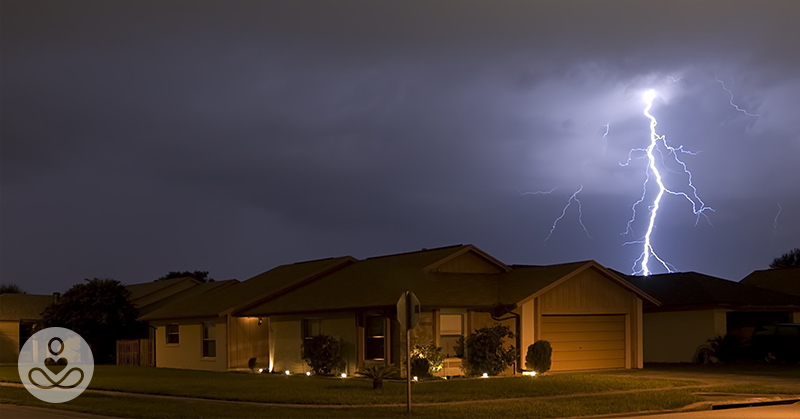Did your grandmother ever say to stay away from the sink or tub during a thunderstorm? Apparently, she wasn’t kidding or being old-school. She actually knew what she was talking about.
Metallic pipes, tubs, kitchen sinks, faucets, and tap water are all conductors of electricity. While pure water may ordinarily be a poor conductor, the dissolved ions in tap water make allow it to conduct much better. According to John Jensenius, a lightning safety specialist for the National Weather Service, it’s best to put off dishwashing, showering, and any other activity that may bring you close to pipes, water or wires during a thunderstorm [1].
“It would be dangerous to be washing your hands or washing dishes,” he explains. “Just avoid those any time you can hear thunder. If you’re at all connected to … anything that plugs into the wall, which could be, for example, a dishwasher or a washing machine that’s plugged into the wall or also has connections to plumbing, that becomes dangerous.”
Lightning is selective of where it strikes, not who
Plastic pipes don’t keep you much safer either. Truly, they offer a small measure of protection, but water is still running through them.
“Water can conduct electricity as well,” he said. “We see that on the outside where lightning strikes something and if there are puddles around, it can easily electrocute somebody nearby the puddle.”
Lightning safety centers around being in the right place at the right time [2]. Lightning isn’t selective of who it strikes, but it can select where to strike. You’d be putting yourself at great risk by being in close proximity with metallic surfaces and running water, whether outdoors to indoors. Water pipes and electric conduits are grounded into the house. Thunder can strike the ground and hit one of these directly.
“When a house is built, it should be built so that when your electricity comes in, it’s grounded to your house,” said Dan Kottlowski, AccuWeather Senior Meteorologist. “If your house is grounded to separate rods that are basically stuck down into the ground, then that’s a bit safer because nothing is attached to the plumbing.”
Tap Water Worsens The Situation
Electrical conductivity is increased when impurities are present in water. Tap water naturally contains various ions including sodium, chloride, calcium, magnesium, iron, and potassium. These can range depending on the municipality. Ions in water allow it to be more conducive of electricity [3]. Since almost everyone uses tap water to bath, it is recommended to avoid bathing during a thunderstorm.
What happens when a person is struck by lightning?
At speeds of 300,000 km/hour, lightning will race to the ground with each bolt containing up to one billion volts and 20,000 amps [5,10]. Needless to say, this could be deadly for anyone in its path.
“[Lightning] can even exceed the power of a nuclear reactor,” Business Insider reports. “When the lightning hits the ground, it causes a trail of plasma that lights the sky with those telltale zigzags of blueish white light that we see as lightning.” [6]
A lightning bolt can reach temperatures of nearly 55, 000 degrees Fahrenheit, that’s five times hotter than the surface of the sun [7]. Getting hit by lightning, while rare, can easily be deadly, leave you with major electrical burns and scaring. Lightning can leave its imprint with a unique type of scaring known as Lichtenberg figures in certain areas of the skin [8]. This figure is likened to the running roots a tree, which occurs when the lightning traces your arteries and veins as it travels. This deep-scarring is usually permanent.
Those that survive a lightning strike may face various medical complications, including:
- Cardiac arrest (due to disruption in the heart’s electrical rhythm)
- Severe brain damage
- Coma
- Temporary or permanent paralysis
- Stroke
- Muscle twitching
- Memory loss
- Personality changes
What to do when a person is struck by lightning [9]
Every second counts. Stay in a safe location and immediately dial 911. Listen to the instructions from the operator and give as much information as you can.
Offer assistance to the person when the threat has passed or lessened in the area. If it’s still raving, get to safety immediately. You’ll be of no help to anyone when you’re equally hurt.
The human body won’t retain electrical charges, so don’t be afraid to touch the person. If they appear not to be breathing, having trouble breathing, or are unconscious use an AED (if available) or commence CPR while waiting for the paramedics. Take extra care with young children when performing CPR. Only remove clothing if necessary.
If they are in shock, lay the victim down with head slightly lower than torso and legs.
If they are conscious, soothe them and talk to them until the paramedics arrive.
It’s important to create awareness to everyone in the home of the danger of lightning strikes. Teach your kids to stay away from faucets and running water during storms. While being struck by or indirectly affected by lightning is rare, it’s always best to aware. Those dishes can wait. Safety first.
Sources
- https://www.accuweather.com/en/weather-news/why-washing-dishes-or-showering-during-a-storm-can-be-extremely-dangerous/70004531
- https://www.nationalgeographic.com/environment/natural-disasters/lightning-safety-tips/
- https://water.usgs.gov/edu/electrical-conductivity.html
- https://www.nationalgeographic.com/environment/natural-disasters/lightning/
- https://www.businessinsider.com/what-to-expect-when-you-survive-lightning-2016-4?IR=T
- https://www.seeker.com/is-lightning-hotter-than-the-sun-1765058578.html
- https://weather.com/health/news/catching-lightning-body-what-happens-when-lightning-strikes-20140114
- https://www.webmd.com/first-aid/lightning-strike-treatment
- https://hyperphysics.phy-astr.gsu.edu/hbase/electric/lightning2.html

